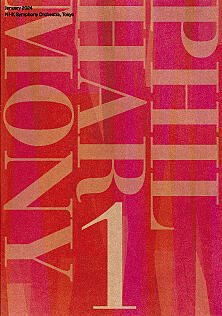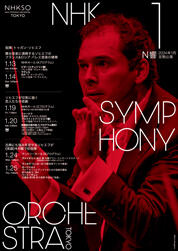- Home
- Concerts
- Subscription Concerts 2023-2024
- Program C
- No. 2002 Subscription (Program C)
Subscription Concerts 2023-2024Program C
No. 2002 Subscription (Program C)
NHK Hall
Google Map Seating Chart

Program
Liadov / Kikimora, légende Op. 63
The Russian composer Liadov departed in 1914 without witnessing the October Revolution unlike Prokofiev (mentioned below), his pupil at the St. Petersburg Conservatory. Coming from a musical family, Liadov was a composer and conductor both fortunate and skilled, as he was trained by his father who was the first conductor of the Mariinsky Theatre, before studying composition under Rimsky-Korsakov, celebrated as a peerless master of orchestration. Despite everything, Liadov’s thin catalog is absent of large-scale works, hence the epithet “miniaturist” is used to describe him. This is thought to be due to his complicated self-critical nature on one hand, while indolent on the other.
Among his expertly colorful miniatures is the tone poem Kikimora composed in 1909. It is, like his popular orchestral piece Baba Yaga (1904), based on a Russian fairy tale. Kikimora starts at a slow tempo with a folky tune on English horn, followed later by the sound of celesta: the female spirit Kikimora was, according to the composer, brought up in rocky mountain by a magician whose cat regaled her with fantastic old tales as she rocked in a crystal cradle. Then comes the abrupt tempo change: Kikimora is now 7 with her head no larger than a thimble and her body no wider than a straw. Liadov’s orchestra depicts here the noisy creature crying out and whistling in the daytime, while spinning flax at night with evil intentions for all the mortals.
[Kumiko Nishi]
Prokofiev / Sokhiev / Romeo and Juliet, ballet suite
Romeo Montague and Juliet Capulet are likely the most famous star-crossed lovers in Western literature. The story by William Shakespeare (1564–1616) of the twosome from feuding families has inspired uncountable artists in all fields. Music world is no exception with Berlioz’s choral symphony (1839), Gounod’s opera (1867) and Bernstein’s modern remake, West Side Story (1957). Tchaikovsky’s overture-fantasy (1869/1870/1880) and his younger compatriot Prokofiev’s ballet are surely the best-known Russian adaptations.
According to Prokofiev’s reminiscences, he had originally composed for an invented happy end considering choreographic convenience. Guided by his innermost artistic intuition and following meetings with the choreographers, the composer ultimately rewrote music for the original tragic ending.
The score was written in the mid-1930s when Prokofiev, after living abroad for eighteen years, returned for good to the Stalinist USSR offering to him some carrots of fame and opportunities. Although less modernistic than before due to this historical background, Prokofiev’s music excellently depicts the Bard’s masterpiece both romantic and violent, both humorous and heart-rending. Prior to the ballet’s first staging in 1938 in Czechoslovakia, Prokofiev compiled extracts into two orchestral suites No. 1 (1936) and No. 2 (1937). Following the 1940 Soviet first staging, the composer made the orchestral suite No. 3 (1946).
The suite performed today consists of selections from these three compilations, chosen and reordered by the conductor Tugan Sokhiev himself around all the seven pieces of Prokofiev’s second suite. I The Montagues and the Capulets includes the most popular number of the ballet, Dance of the Knights: the overbearing dotted melody on violins and clarinet is accompanied by the robust low brass. V Romeo and Juliet before Parting is from the couple’s morning scene after their first night, while grievous IX Romeo at Juliet’s Grave relates the desperate hero’s suicide and then the heroine’s death. After recalling the cheerful nature of Mercutio (Romeo’s best friend) at X Masks, the present suite ends with dramatic XI Death of Tybalt from the crucial scene where Tybalt (Juliet’s cousin) kills Mercutio and then Romeo, furious, avenges him.
[Kumiko Nishi]
*This concert will have a duration of 60 to 80 minutes without an interval.
Artists
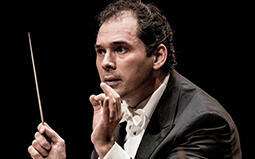 ConductorTugan Sokhiev
ConductorTugan Sokhiev
Born in Vladikavkaz in North Ossetia of the former Soviet Union in 1977, Tugan Sokhiev studied conducting under the legendary tutors Ilya Musin and then Yuri Temirkanov at the St. Petersburg Conservatory. Since 2008, as Music Director of the Orchestre national du Capitole de Toulouse, he has contributed to the development of the orchestra, at the same time, served as Principal Conductor of the Deutsches Symphonie-Orchester Berlin from 2012 to 2016. Furthermore, from 2014, he served as Music Director of the Bolshoi Theatre in Moscow, while making guest appearances with prestigious orchestras and at opera houses, including the Wiener Philharmoniker, the Berliner Philharmoniker and the Royal Concertgebouw Orchestra, thus has actively worked internationally in concerts and operas. In 2022, grieved by the invasion of Ukraine by Russia, his beloved homeland, he resigned from his posts at both the Bolshoi Theatre and the Orchestre national du Capitole de Toulouse, however, even after that he has continued to be in full demand from all over the world. He has been highly evaluated for his accurate sense of style and rich interpretations such as the dynamic scale he introduces to perform Russian works, the sophisticated sense he employs to French repertoire and his full expression in an orthodox approach towards German works. He has returned to the NHK Symphony Orchestra almost every year to present delightful performances. On this visit, he will surely demonstrate his diversity in expression through three programs of French, German and Russian works.
[Motoyuki Teranishi, music critic]
Pre-concert Chamber Music Performance
Pre-concert Chamber Music Performance
Program:Mosolov / String Quartet No. 1 Op. 24 - 3rd Mov. & 4th Mov.
Artists
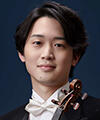
Ko Goto
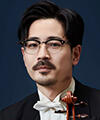
Masamichi Yokoshima
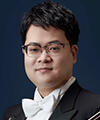
Shotaro Nakamura
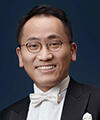
Hiroya Ichi
Download
Ticket
Program C
No. 2002 Subscription (Program C)
NHK Hall
Google Map
Seating Chart
Single Tickets Release Date
Pre-sales for Subscribers:Thursday, October 26, 2023
*about subscribers
Sale to General Public:Sunday, October 29, 2023
Price
| S | A | B | C | D | E | |
|---|---|---|---|---|---|---|
| Ordinary Ticket | 7,600 | 6,700 | 5,300 | 4,300 | 3,300 | 1,600 |
| Youth Ticket | 3,500 | 3,000 | 2,400 | 1,900 | 1,400 | 800 |
Seating chart Enlarge Print PDF
*tax included
*Subscribers receive a 10% discount (Available at NHKSO WEB Ticket and N-Kyo Guide)
*For wheelchair-accessible seats, please refer to the N-Kyo Guide
Youth Tickets
Youth Tickets are great options for those of 25 years old and younger
Subscription tickets
Release Date
ANNUAL SUBSCRIPTION TICKETS
Mon., July 17, 2023 10:00am
[For Subscribers: Sun., July 9, 2023 10:00am]
SEASONAL SUBSCRIPTION TICKETS (WINTER)
Tue., Oct. 17, 2023 10:00am
[For Subscribers: Thu., Oct. 12, 2023 10:00am]
Where to buy
NHKSO WEB Ticket | Friday, January 19 (In English / Seats not selectable)
NHKSO WEB Ticket | Saturday, January 20 (In English / Seats not selectable)
NHKSO WEB Ticket (In Japanese only / Seats selectable)
N-Kyo Guide (Purchase by telephone only)
Other Ticket Agents
Broadcast
 NHK-FMNo. 2002 Subscription (Program C)
NHK-FMNo. 2002 Subscription (Program C)
Friday, Jan 19, 2024 7:30PM - 9:10PM
Program:
Liadov / Kikimora, légende Op. 63
Prokofiev / Sokhiev / Romeo and Juliet, ballet suite
*This concert will have a duration of 60 to 80 minutes without an interval.
Conductor:Tugan Sokhiev
Recorded:January 19, 2024 NHK Hall
*Repertoire, conductor, soloists and program order are subject to change without notice.
*Pre-school children are not allowed in the concert hall

